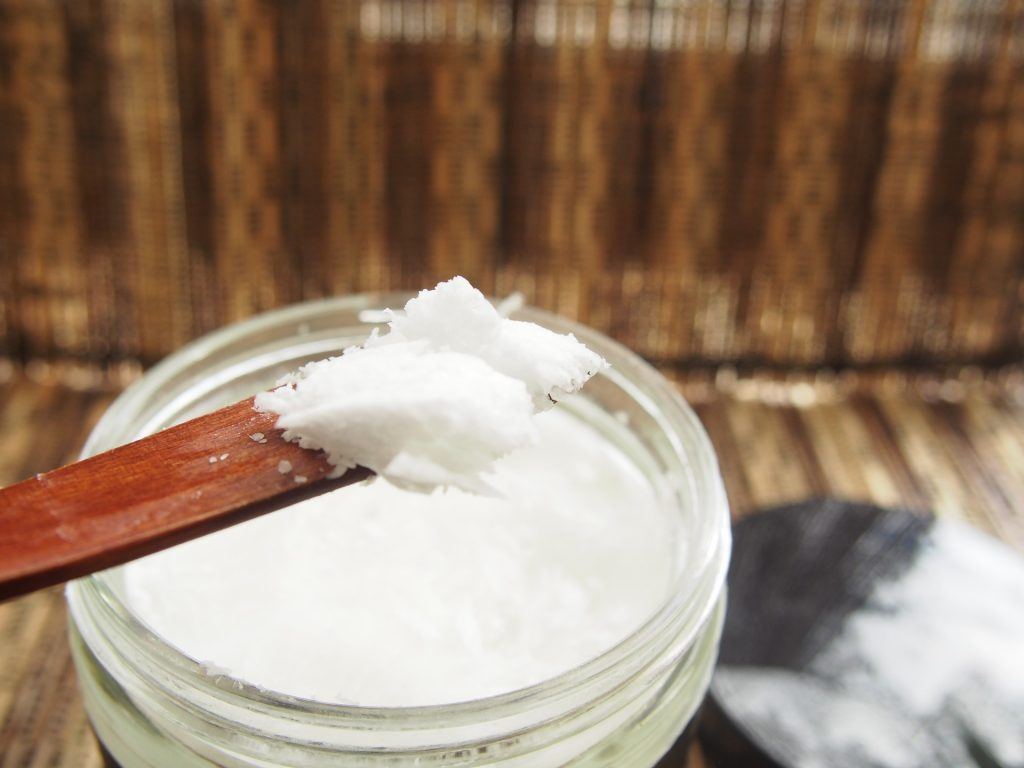
In recent years, the popularity of coconut and particularly coconut oil has soared because of touted health benefits. Fueling the coconut oil trend, celebrity endorsements have claimed the ingredient to help blast away belly fat, curb appetite, strengthen the immune system, prevent heart disease, and stave off dementia and Alzheimer’s disease. A survey found that 72% of Americans rated coconut oil as “healthy,” though only 37% of nutrition experts agreed. [1] Coconut oil is popular in several trending diets including ketogenic and Paleo diets.
As consumer demand for plant-based foods increases, coconut oil has become a popular fat choice for its rich flavor with a mild coconut aroma.
Source Of
Coconut oil is 100% fat, 80-90% of which is saturated fat. This gives it a firm texture at cold or room temperatures. Fat is made up of smaller molecules called fatty acids, and there are several types of saturated fatty acids in coconut oil. The predominant type is lauric acid (47%), with myristic and palmitic acids present in smaller amounts, which have been shown in research to raise harmful LDL levels. Also present in trace amounts are monounsaturated and polyunsaturated fats.
Coconut oil contains no cholesterol, no fiber, and only traces of vitamins, minerals, and plant sterols. Plant sterols have a chemical structure that mimics blood cholesterol, and may help to block the absorption of cholesterol in the body. However, the amount found in a few tablespoons of coconut oil is too small to produce a beneficial effect.
Coconut Oil and Health
- Many of the health claims for coconut oil refer to research that used a special formulation of coconut oil made of 100% medium-chain triglycerides (MCTs), not the commercial coconut oil most available on supermarket shelves. MCTs have a shorter chemical structure than other fats, and so are quickly absorbed and used by the body. After digestion, MCTs travel to the liver where they are immediately used for energy. The theory is that this quickly absorbed form promotes satiety and prevents fat storage. Coconut oil contains mostly lauric acid, which is not an MCT. Lauric acid is absorbed more slowly and metabolized like other long-chain fatty acids. So the health benefits reported from a specially constructed MCT coconut oil that contains medium-chain triglycerides other than lauric acid cannot be applied directly to commercial coconut oils. [2]
- Although epidemiological studies find that groups of people who include coconut as part of their native diets (e.g., India, Philippines, Polynesia) have low rates of cardiovascular disease, it is important to note that many other characteristics, dietary and other, could be explanatory. Also, the type of coconut they eat is different than what is used in a typical Western diet. These groups do not eat processed coconut oil, but the whole coconut as coconut meat or pressed coconut cream, along with an indigenous diet of foods rich in fiber and low in processed and sugary foods. [2]
- A literature review on the use of coconut products (oil, milk, flesh, or cream) included 21 observational and clinical studies. [2]
- The epidemiological studies observed people from Samoa, the Philippines, New Zealand, and New Guinea consuming whole coconut as part of their traditional diets. Overall their diets were similar: coconut flesh and milk, fresh fruit, vegetables, and fish. Studies found that those who ate higher amounts of coconut oil had increased beneficial HDL cholesterol levels but also increased total cholesterol and triglycerides.
- Eight small short-term clinical trials lasting from 5-8 weeks with a range of 9-83 participants were examined with an intervention of a coconut oil diet. When compared with a butter or unsaturated fat (olive or safflower oil) diet, coconut oil raised total cholesterol, HDL, and harmful LDL levels more than unsaturated oils, but not more than butter. Coconut oil was also found to raise total and LDL cholesterol to a greater or similar degree as other saturated fats like beef fat and palm oil.
- The authors concluded that because of coconut oil’s effects on raising blood cholesterol including harmful LDL and in some cases triglycerides, and because its cholesterol-raising effects were comparable to other saturated fats, the oil should not be viewed as a heart-healthy food and should be limited in the diet.
- In a meta-analysis of 16 clinical trials, coconut oil was found to increase both LDL and HDL cholesterol levels in participants, compared with nontropical vegetable oils (e.g., sunflower, canola, olive). [3] Coconut oil increased total cholesterol by about 15 points, LDL by 10 points, and HDL by 4 points. Coconut oil also increased these values when compared with another tropical oil, palm oil: total cholesterol increased by about 25 points, LDL by 20 points, and HDL by 3 points. The analysis did not find that coconut oil versus other vegetable oils had any significant effect on body weight, waist circumference, or body fat percentage.
- The American Heart Association (AHA) issued a scientific advisory statement in 2017 to replace saturated fats (including coconut and other tropical oils) with unsaturated fats. Based on a review of seven controlled trials, coconut oil was found to raise harmful LDL cholesterol levels. The AHA advised against the use of coconut oil, and suggested limiting all saturated fat. For those at risk for or who have heart disease, they advise no more than 6% of total calories from saturated fat, or about 13 grams based on a 2000-calorie diet. One tablespoon of coconut oil comes close to that limit at about 12 grams of saturated fat. [4]
- Coconut oil contains as many calories and total fat as other fat sources, about 120 calories and 14 grams of fat per tablespoon. Coconut oil has a unique flavor and is best used in small amounts as a periodic alternative to other oils in baking and cooking, in context of a healthy eating pattern.
Purchase and Storage
Coconut oil is made by pressing fresh coconut meat or dried coconut meat called copra. Virgin coconut oil uses fresh meat, while refined coconut oil typically uses copra. Unlike olive oil, the terms “virgin” and “extra virgin” are not regulated with coconut oil. There is no difference in products labeled with these terms.
- Virgin or Extra Virgin (interchangeable terms): If using a “dry” method, the fresh coconut meat of mature coconuts is dried quickly with a small amount of heat, and then pressed with a machine to remove the oil. If using a “wet” method, a machine presses fresh coconut meat to yield milk and oil. The milk is separated from the oil by fermentation, enzymes, or centrifuge machines. The resulting oil has a smoke point of about 350 degrees Fahrenheit (F), which can be used for quick sautéing or baking but is not appropriate for very high heat such as deep-frying. You may also see the following terms on labels of coconut oil:
- Expeller-pressed—A machine presses the oil from coconut flesh, often with the use of steam or heat.
- Cold-pressed—The oil is pressed without use of heat. The temperature remains below 120 degrees F; this is believed to help retain more nutrients.
- Refined: The copra is machine-pressed to release the oil. The oil is then steamed or heated to deodorize the oil and “bleached” by filtering through clays to remove impurities and any remaining bacteria. Sometimes chemical solvents such as hexane may be used to extract oil from the copra. The resulting oil has a higher smoke point at about 400-450 degrees F, and is flavorless and odorless.
- Partially Hydrogenated: The small amount of unsaturated fats in coconut oil is hydrogenated or partially hydrogenated to extend shelf life and help maintain its solid texture in warm temperatures. This process creates trans fats, which should be avoided.
Store coconut oil in a cool dark location in a sealed container or in the refrigerator. The shelf life will vary, depending on the type of processing and how it is stored. Refined coconut oil generally lasts for a few months, whereas virgin coconut oil may last for 2-3 years if stored properly away from heat and light. Signs of spoilage include mold, a yellow tint, or “off” odors or flavors.
Make
Coconut oil has a melting point of 78 degrees F. If the oil liquefies on a very warm day, stir well before using.
- When substituting coconut oil for butter or vegetable shortening, use 25% less coconut oil than the amount of butter listed in the recipe due to its higher percentage of fat solids. Use refined coconut oil if you do not want a coconut flavor.
- Sauté vegetables in one tablespoon of virgin coconut oil to vary the flavor.
- Add a tablespoon of virgin coconut oil to sauces and curries to enhance flavor.
Did You Know?
- The Philippines is the greatest worldwide producer of coconut oil. Indonesia and India are the next largest producers. The Philippines, European Union, United States, and India are the greatest consumers of coconut oil.
- Coconut oil is an effective moisturizer for skin and hair. Using a small amount, gently massage directly into skin. For dry or frizzy hair, apply a small amount to the hair shaft and leave in for desired time (a few minutes to overnight), and then wash out.
Related
- Saturated fat, regardless of type, linked with increased heart disease risk
- Setting the record straight: It’s best to swap out saturated fats for healthier fats
- Ask the Expert: Healthy Fats

